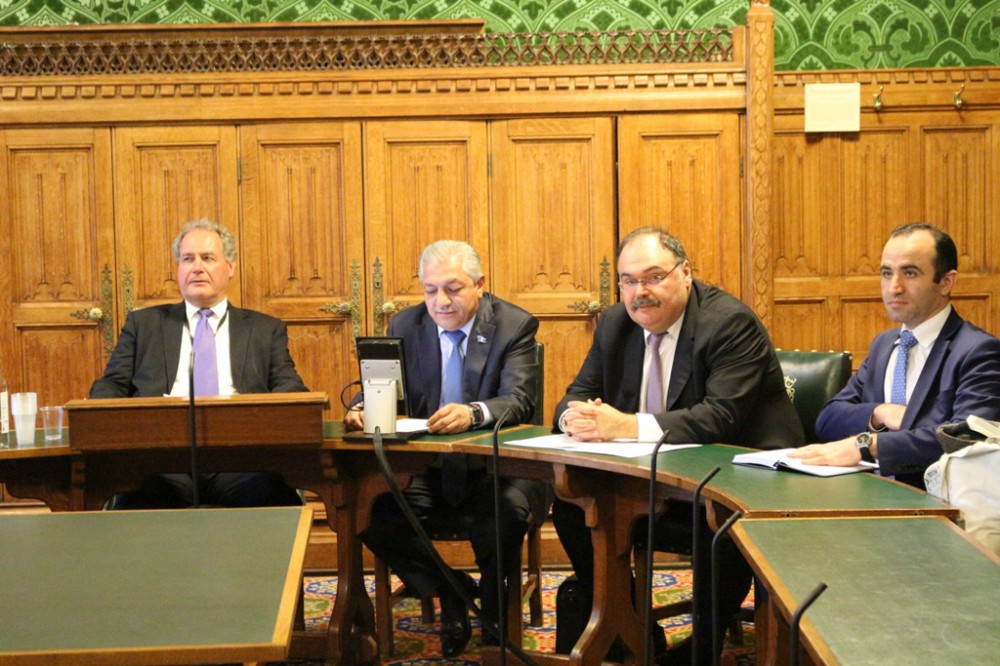British Parliament holds public hearings on Nagorno Karabakh conflict

By Gunay Camal
The achievement of peace in the region is important for the region and will pave the way to strengthening of relations between Azerbaijan and Britain.
British Minister of State for Europe David Lidington made the remake in his letter, which was read out at public hearings held at the British Parliament over the Nagorno-Karabakh conflict, Azertac reports.
Lidington highlighted his concern over recent tensions in Nagorno-Karabakh and casualties in recent battles, reminding that he signed the statement which called both sides to ceasefire on April 2.
“Britain does not attend directly in negotiation but supports the efforts of international community and organizations such as the UN, OSCE for the solution of the conflict,” the letter reads.
“Britain hopes for the solution of the conflict within the framework of basic principles of Minsk Group and returning the occupied Azerbaijani territories. The OSCE Minsk Group co-chairs visited the region recently and direct consultations have been conducted with both sides. We will continue to call Azerbaijan and Armenia sides for strengthening peaceful negotiations.”
The conflict between Armenia and Azerbaijan began in 1988 when Armenia made territorial claims against Azerbaijan. As a result of the ensuing war, in 1992 Armenian armed forces occupied 20 percent of Azerbaijan, including the Nagorno-Karabakh region and seven surrounding districts. The 1994 ceasefire agreement was followed by peace negotiations.
Azerbaijani MP Javansir Feyziyev, informing the British parliamentarians about the history of the conflict, reminded the division of Azerbaijan between Iran and Russia in 19th century and Armenians’ settlement in Azerbaijani lands after the division.
“Those Armenians were mainly settled in Yerevan and Karabakh. Afterwards, Armenians made claims for the territories and occupied 20 percent of Azerbaijani territories taking the advantage of the collapse of Soviet Union. Since that time, the conflict is a severe danger for the security and welfare, and also the obstacle for economic and social development,” he said, voicing hope that the conflict will be resolved, peace will be restored and refugees and IDPs will return to their lands.
Azerbaijan’s ambassador Tahir Tagizade, for his part, reminded that Armenia is mono-ethnic country and Azerbaijani people became refugees and IDPs by Armenian force.
“On contrary, Azerbaijan has never conducted any historical, cultural and ethnic cleaning as Armenia. The existence of the Armenian church in the center of Baku can be a good example despite continuing conflicts,” he said.
The envoy further stated that the international community fails to force Armenia to peaceful solution of the conflict. “The clashes occur in internationally recognized territories of Azerbaijan as a result of Armenian provocations. It is our natural right to defend our internationally recognized territories and answer the threats against our sovereignty.”
“The silence of the international community to Armenia’s unfair behaviors leads to Armenia’s insistence on its unconstructive position. In April war, Armenia not only violated the ceasefire constantly, but also started to shoot the civilians. During the 4-day war, we did not intend to get strategic altitude and we made this step for the safety of civilians,” he said.
The ambassador applauded fair position of Britain in the conflict, urging the UK and other countries to play a bigger role in the resolution of the conflict considering their historical relations with the region.
“Armenia needs to understand that they cannot accomplish anything by violence and force. Restoration of peace and sovereignty, commerce and economic development as well as establishment of well-grounded relations is related to this,” he concluded.
Long-simmering tensions between Armenia and Azerbaijan flared again on April 2 when the Armenian side began to shell the Azerbaijani positions and settlements along the frontline. To protect civilian population, the Azerbaijani Armed Forces launched counter attacks and repulsed the enemy forces back. On April 5, the two sides agreed on a ceasefire. However, the Armenian forces commit armistice breaches on the frontline almost every day targeting civilians and shelling villages.
Baku has already announced that the ceasefire does not mean that Azerbaijan’s occupied lands will remain under occupation. Azerbaijan has agreed to ceasefire but warned that it will not turn blind eye if Armenian side commits provocation. Baku is ready for peace and sits at the table of negations, but it will not tolerate the endless occupation of its historical lands.
---
Follow us on Twitter @AzerNewsAz
Here we are to serve you with news right now. It does not cost much, but worth your attention.
Choose to support open, independent, quality journalism and subscribe on a monthly basis.
By subscribing to our online newspaper, you can have full digital access to all news, analysis, and much more.
You can also follow AzerNEWS on Twitter @AzerNewsAz or Facebook @AzerNewsNewspaper
Thank you!
